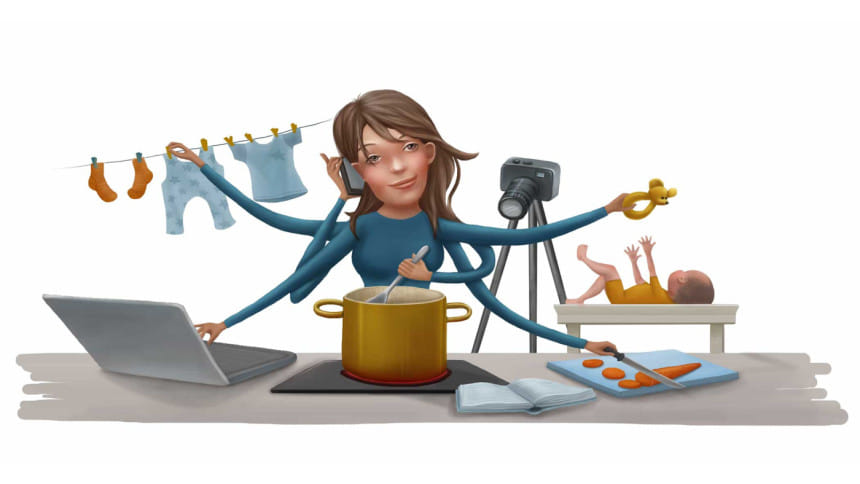Why do we accept men’s bad behaviour as ‘culture’?

An article in this daily, titled "Women don't want to be superhumans" (published on February 2, 2022), has inspired me to write this column. The author, Afia Jahin, made valid points about how women are expected to be superhumans—juggling jobs, relationships, raising children and caring for the elderly in the family. Women's acceptance of grown-up men acting immature for their age, with widely used phrases like "boys will be boys," perhaps enables the latter. The other widely known stereotype is that men are "serious" at their jobs, and so women must be "family-oriented"—even if a woman is smarter than her spouse. These stereotypes continue to enable men's bad behaviour.
While travelling across Bangladesh for work, I often get to hear narratives similar to what Afia presented in her article. Women and girls think they have to "make sacrifices" for the greater good, that they have to "hold the fort" of family struggles, and take on tasks both at home and outside. These perceptions become the reality when people are asked about their future: most boys would say that their aspirations were to get ahead in life, choose the right career path and travel abroad, while the majority of girls would say they wanted to rear children and have happy family lives. But just as girls should aspire to be successful in their careers, shouldn't boys also aspire to grow up and be responsible fathers? Since boys don't set family life as a priority, their attitude towards family life often results in entitled (read: bad) behaviour towards their spouses and children.
Unless we start teaching children—both boys and girls—that they all need to be responsible for their families and work together with their partners, these patriarchal notions will continue to hinder our growth, both as individuals and as a nation. A few real stories that I have heard over the years depict Afia's points clearly.
Exhibit A: Lisa (not her real name) has accepted that boys will be boys. Her mother and grandmother have convinced her that boys don't grow up—that they can get away with acting immature and not fulfilling their duties at home. So when she found out that her husband was having an affair with his co-worker, she accepted it. He was coming home late, looking at his phone most days and not paying any attention to their children. She was aware of the reality, but blamed herself for her husband's bad behaviour. Her own mother told her to stay quiet and pretend nothing happened. Even though Lisa studied economics, she got married and had children right after graduation. If she wanted to keep her dignity and move out with her children, who would take care of them? She had no prior work experience. She was afraid her husband wouldn't pay for their children's education if she left, and she would have to face hassle in society.
Exhibit B: Marufa's husband beats her, but at least she has a husband. She works as a housemaid and wanted to receive additional training to earn more. When asked how her relationship at home was, she bluntly said that her husband beat her once in a while. She seemed to be okay with it! Her relatives who live nearby in slums often intervene, she and her husband remain distant for a few days, but then everything goes back to normal. When asked why she endured this behaviour, Marufa explained that living in a slum without a husband meant that other men would be bothering her. According to her, women cannot live alone for safety reasons. Even though there are strict laws in that the country against domestic abuse, she said they didn't matter in the slums. Complaining about him would increase problems for her, she said, as even law enforcers would be flirting with her. She cited a similar case of her friend, who raised her voice against her abusive husband, but got blamed for everything instead and had to leave the slum. In Marufa's world, society accepts that men can abuse their wives, and it's okay.
Exhibit C: Deepa's too beautiful to study after Class 10. Her parents fear that if she continues to go to school, the local goons who bother her may harm her even more. She used to get constantly harassed when she was in school, but she was able to complete her SSC examination. Now, her parents want her to marry a man who lives abroad, so that she can have a better future. But one of Deepa's cousins got married at the same age as her's and went abroad, only to return after two years with a child, abused. Deepa wants to continue her studies, complete her graduation and then get married. But she doesn't think her parents will allow that. Her father has made it very clear that unless a woman is married and has children, her duties remain unfulfilled.
Such are the cases of millions of girls in Bangladesh. While we understand that we have to treat our girls the same as our boys, we are failing to practise it in real life. In such circumstances, women have to stand up against such "bad behaviour." Men, too, need to understand that how our forefathers behaved in the family was not right, and our household "culture" has to change if we want women to move forward. The country's policy and practice should support women to become financially independent. Women are not superhumans, and they should stop accepting bad behaviour from men in society.
Tasmiah T Rahman is the head of the Skills Development Programme at Brac. This article is her own opinion and not her employer's.

 For all latest news, follow The Daily Star's Google News channel.
For all latest news, follow The Daily Star's Google News channel. 



Comments